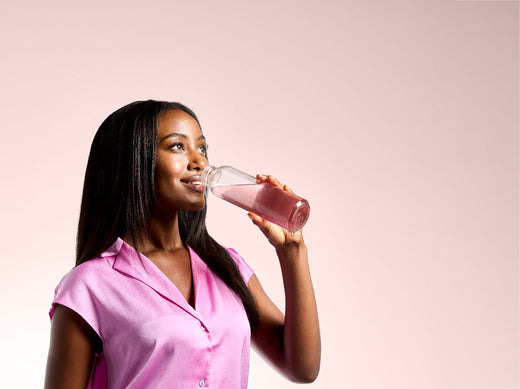
Who needs hydration anyway
Staying hydrated is often touted as one of the simplest steps we can take for our health, yet for many, it’s surprisingly difficult to achieve. In fact, research shows that up to 78% of Brits don’t drink enough water daily. But what does staying hydrated actually do for us, and why should it be a priority?
The Benefits of Staying Hydrated
Did you know that our bodies are roughly 60% water? And that every single cell, tissue, and organ requires water to function effectively. So staying hydrated is pretty important…
Hydrating well helps regulate body temperature, transport nutrients, and remove waste and It even impacts mood, focus, and energy levels.
Dehydration can lead to fatigue, headaches, and reduced concentration and even mild dehydration can impact physical performance, making it essential for those who lead active lifestyles.
And if that wasn’t enough to convince you, drinking water consistently throughout the day supports digestion, helps to keep skin looking healthy, and may even help with managing a healthy weight!
How Much Water Do You Need?
The NHS recommends that we drink 6-8 glasses (around 1.5-2 litres) of fluid per day, which includes water, lower-fat milk, and sugar-free drinks like tea and coffee. Those who are active or in warmer climates may require additional fluids to replace what’s lost through sweating.
While these recommendations provide a general guideline, people’s hydration needs vary based on age, lifestyle, and health conditions.
Also, we don’t have to get all our fluids from drinking plain water. Many foods, especially fruits and vegetables, contain a high percentage of water and contribute to our daily intake.
Does Drinking Tea Count?
Yes, "tea does count towards your daily hydration goal, although it’s important to be mindful of caffeine," says nutritionist Clarissa Lenherr. "Contrary to popular belief, moderate caffeine intake does not significantly dehydrate the body, but excessive amounts can have a mild diuretic effect! Therefore, I would recommend including mostly non-caffeinated options such as herbal teas alongside water for optimal hydration."
What if You Don’t Like the Taste of Water?
If you're someone who "struggles with the taste of plain water, you can do a few things to make it more enjoyable," notes Clarissa. "Infuse water with slices of fruit like lemon, lime, or berries, or add fresh herbs such as mint or basil. Or, if you're feeling a little lazier, reach for naturally flavoured water products like Sipgood, which offers a boost of flavour without relying on artificial sweeteners or additives found in many commercial squash drinks."
Why Is Sipgood Better Than Drinking Squash
"While squash can add flavour, it often comes with artificial flavours, colours, sweeteners or high amounts of sugar, none of which benefit our health," says Clarissa. "Sipgood, by contrast, is naturally flavoured and free from these additives and sugar. It also contains essential vitamins and electrolytes, which provide added hydration benefits and support nutrient intake."
Hydration is a key component of a healthy lifestyle, influencing everything from energy levels and brain function to skin health and digestion. If you’re not keen on plain water, don’t worry – there are plenty of healthy ways to stay hydrated. Products like Sipgood offer a great alternative to sugary or artificially flavoured drinks, giving you hydration with added health benefits. So, let’s make a conscious effort to drink up – your body will thank you!
REFERENCES
1. https://www.puregym.com/blog/uk-fitness-report-gym-statistics/
2. https://www.nhs.uk/live-well/eat-well/food-guidelines-and-food-labels/water-drinks-nutrition/

